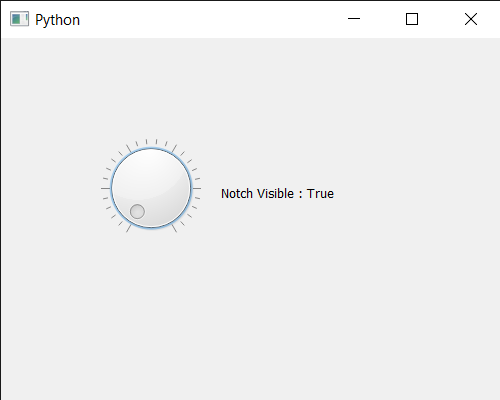En este artículo veremos cómo podemos hacer visible la propiedad de muesca de QDial, por defecto la muesca de QDial está deshabilitada aunque podemos hacerla visible en cualquier momento con la ayuda del setNotchesVisiblemétodo. La muesca es básicamente una serie de muescas dibujadas alrededor del dial para indicar el rango de valores disponibles.
Para hacer esto usamos notchesVisibleel método con el objeto QDial
Sintaxis: dial.notchesVisible(True)
Argumento: no requiere argumento
Return : Devuelve bool
A continuación se muestra la implementación.
# importing libraries
from PyQt5.QtWidgets import *
from PyQt5 import QtCore, QtGui
from PyQt5.QtGui import *
from PyQt5.QtCore import *
import sys
class Window(QMainWindow):
def __init__(self):
super().__init__()
# setting title
self.setWindowTitle("Python ")
# setting geometry
self.setGeometry(100, 100, 500, 400)
# calling method
self.UiComponents()
# showing all the widgets
self.show()
# method for components
def UiComponents(self):
# creating QDial object
dial = QDial(self)
# setting geometry to the dial
dial.setGeometry(100, 100, 100, 100)
# making notch visible
dial.setNotchesVisible(True)
# creating a label
label = QLabel("GeeksforGeeks", self)
# setting geometry to the label
label.setGeometry(220, 125, 200, 60)
# making label multiline
label.setWordWrap(True)
# getting notch visible property
value = dial.notchesVisible()
# setting text to the label
label.setText("Notch Visible : " + str(value))
# create pyqt5 app
App = QApplication(sys.argv)
# create the instance of our Window
window = Window()
# start the app
sys.exit(App.exec())
Producción :
Publicación traducida automáticamente
Artículo escrito por rakshitarora y traducido por Barcelona Geeks. The original can be accessed here. Licence: CCBY-SA